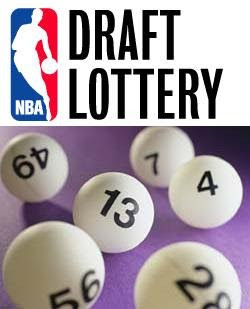History of the NBA Draft Lottery Format
- Posted in:
- Google Charts
- NBA
- NBA Draft
Every season in the NBA, there comes a point where you start hearing whispers about certain teams "tanking". Eyebrow-raising trades, mystery injuries, and dubious coaching strategies naturally make us all suspicious--especially as teams rack up losses. Inevitably, there's an outcry to reform the NBA draft lottery to reduce or eliminate the incentive to tank. But that's the purpose of the lottery in the first place, right? So why do teams still tank? Let's look at the history of the lottery format for some answers.
Format #1: Early Lottery System (1985-1989)
In this version, all the lottery teams (teams that didn't make the playoffs) were given an equal chance at the first overall pick. The flat line in the graph says it all. No matter where you land in the standings at the end of the year, if you don't make the playoffs, you get the same chance as all the other lottery teams. So there was no incentive to tank...or was there?
If I was a GM and my team was likely to be first round fodder in the playoffs 1 Think 7th or 8th seed , I'd be tempted to lose a few games down the stretch and try to miss the playoffs. I'd have just as good a chance to win the lottery as everyone else, even though I just missed making the postseason. Smart GM's with key starters injured for the season or a roster full of past-their-prime stars likely considered doing this. Wouldn't you?
Another problem with format #1 is that the very worst teams were statistically unlikely to pick near the top of the draft year after year. Although not directly related to tanking, it was perceived as unfair.
Format #2: Weighted Lottery System (1990-1993)
This version of the lottery addressed some of the shortcomings of format #1. The "weaker" playoff-bound teams had reduced incentive to tank and get into the lottery. Presumably, a team that did this would be one of the "better" lottery teams and would thus have a very low chance of winning the lottery. The worse a team was, the more likely it was to pick near the top of the draft each year. This was perceived as more fair, giving teams that needed the most help greater odds to pick near the top of the draft.
Format #2 did create a new, minor flaw: it gave lottery teams incentive to tank no matter how good or bad their won-loss record was. Every time a team dropped one position in the standings, their lottery odds increased by about 1.5%. The reward for tanking was the same whether it was a "good" lottery team or a "bad" one. The graph bears this out. Lottery odds, although sloped, were still linear.
Ultimately, this version of the lottery was doomed by a statistical anomaly: in 1993, the Orlando Magic won. The Magic, who had also won the lottery the previous year, were the "best" lottery team and had only a 1/66 chance of winning 2 In Orlando's defense, they just barely missed the playoffs, getting eliminated from contention at the end of the season by virtue of a tie-breaker with Indiana. . The back-to-back lottery wins spurred the league to tweak the percentages, leading to...
Format #3: Weighted Lottery System (1994- present)
This was a classic knee-jerk reaction. Odds were skewed to more heavily favor the worst teams in this version. It's bottom-heavy, as you can see from the graph, which is no longer linear. This attempt to address the possibility of "good" lottery teams winning the lottery didn't really work. Over the course of time, a team with long odds was bound to win 3 See Chicago 2008, Cleveland 2011, Cleveland 2014 .
A new phenomenon was born out of this version: the "race to the bottom". Odds were skewed enough so that tanking was only worthwhile if you could lose enough to have one of the 3 or 4 worst records in the league. You couldn't tank half-assed. If you tanked, you had to tank hard. There were fewer teams doing it, but for the ones that did, it was more obvious than ever.
So where does the NBA go from here? Revert to a previous lottery format? Go with the status quo? Come up with format #4? Scrap the lottery entirely?
Before we dive head-first into a complex framework of ideas for lottery reform, let's get a little perspective and take a historical look at the NBA lottery results.





Comments